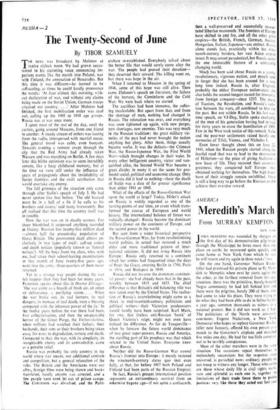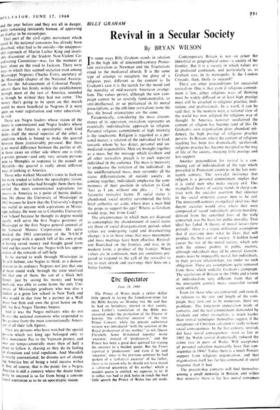AMERICA
Meredith's March
From MURRAY KEMPTON
NEW %.)iii;
JAMES MEREDITH was wounded by shotgun on the first day of his demonstration pilgrimage through the Mississippi he loves more than any place on earth; be recovered quite quickly and came home to New York from which he sass he will return and try again in three weeks' time.
On the one hand, Governor Nelson Rocke- feller had promised his private plane to fly Mere- dith to Memphis when next he starts again. On the other, at the farthest removal from this epic attention, there was the primitive, barely-hopeful Negro community he had left behind him and there were the pilgrims, barely 200 of them. who had come to take his place. They were trying to do what they had been able to do in Selma hardly a year ago, summon thousands as witness to a national protest. But it did not work as it had. The politicians of the North were anxiously courteous; Eugene Nickerson, a New York Democrat who hopes to replace Governor Rocke- feller next January, offered his own person as a match to the Governor's airplane and marched five miles one day. He had far too little company not to be terribly conspicuous.
Most of the other marchers were in the same situation. The occasions repeat themselves in melancholy succession; but the response, once universal, is parochial now; ordinary people do not troop to witness any longer. Those who come are those whose daily life is civil rights work: rare and splendid as each one is, together the limitations of their trade force them to Public postures very like those they acted out last yeal and the year before and 'they are all in danger, while remaining intricately human, of appearing oa display to be stereotypes.
That part of the civil fights movement which could fit the national consensus has already been absorbed; what had to be outside—the unappeas- able reproach of Martin Luther King and insati- able discontent of the Student Non-Violent Co- ordinating Committee—was, for the moment at least, alone on the road to Jackson. There were ways in which they seemed sectarian even among Mississippi Negroes; Charles Evers, secretary of the Mississippi chapter of the National Associa- tion for the Advancement of Coloured People, outcast there but firmly within the establishment through most of the rest of America, sounded as though he wished they had not come. 'The money that's going to be spent on this march would be more beneficial to Negroes if it were spent on voter registration and voter education,' he said.
There are Negro leaders whose vision of the future is conventional and Negro leaders whose Vision of the future is apocalyptic; each kind thinks itself the moral superior of the other, a condition which is bound to make the quarrel between them irretrievably personal. But there is no moral difference between the parties at all; in those cases on either side where one is truly a serious person—and only very serious persons went to Memphis in response to the assault on Meredith—the quarrel is really about different ways of looking at America.
Those who walked Meredith's route to Jackson last week tended to follow the apocalyptic vision; yet the Meredith who had brought them there has carried the most conventional aspirations for success in America to a point of heroic dedica- (ma. He chose the University of Mississippi in 1962 because he knew that the University's degree was useful to anyone with aspirations in Missis- sippi politics. He went on to Columbia University Law School because he thought its degree would equally well serve the first Negro governor of Mississippi or the first Negro general counsel of the General Motors Corporation. He quite shucked the 1963 convention of the NAACP youth group with a speech full of his own pride at having saved money and bought good farm land and his scorn for any Negro with less appre- ciation of the rewards of self-help.
Si he started to walk through Mississippi in his pith helmet, one begins to think, as a demon- stration to its ordinary Negroes not just that one of them could walk through the state unafraid but that one of them, the son of a black belt
farmer, just by saving his money and being
unafraid, was able to come home the only Uni- YersitV of Mississippi graduate who was also a
Student at a great law school in New York and Who would in due time be a partner in a Wall Sheet law firm and own the great house on the hill. the first Negro Thomas Sutpen.
And it was the Negro militants who do not fit into the national consensus who responded to this gesture from the most conventionally Ameri- Can of all their folk figures.
They are persons who have watched the special passion which not long ago belonged only to th'ar movement flee to the Vietnam protest, and who are temperamentally more than of half a mind to follow it, sharing as they do its feeling
of alienation and total repulsion. And Meredith is utterly conventional; he dreams not of chang- ing America but of being a total success within it. But, of course, that is the point; for a Negro, America is still a country where the desire limit- lessly to succeed is so far from being a conven- tional aspiration as to be an apocalyptic vision.































 Previous page
Previous page